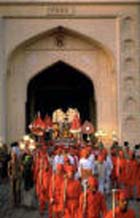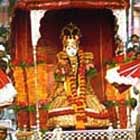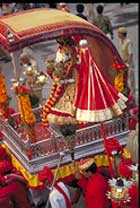Teej is celebrated mainly by the women folk of Rajasthan. Married women who
idolize Parvati for her devotion to her husband Shiva celebrate Teej.
It is believed that seeking Parvati's blessings on this day results in continued marital bliss.
Women fast and dedicate themselves to their husband and family. It is
believed that by praying to Parvati, marital bliss is obtained as on
this day the Goddess Parvati as a bride joins her husband Lord Shiva.
Women dress up in all their finery to worship the goddess. The
festivity revolves around singing and dancing in praise of Parvati.
All over Rajasthan, swings (Jhoolas) are hung from trees and decorated
with leaves and flowers. Ladies and girls can be seen enjoying on these
swings, playing games, singing folk songs and applying Mehandi on their
palms. It
is a popular belief that the intensity of a man's love for his wife can
be gauged from the color of henna on the wife's palm. The darker the
henna, the more a man loves his wife.
Laheria (tie and dye fabric) and Ghewar ( a type of sweet) are
traditionally associated with Teej. Days before the festival, main
markets of Jaipur wear a festive look with abundance of Laheria and
Ghewar.
The image of Parvati is called Teej Mata and is taken out for two days
in a ceremonial procession. The
Teej idol is covered with a canopy whereas the Gangaur idol is open.
A few days before the festival, the image is repainted and on the day of
Teej, it is bedecked in a new dress and traditional jewellery and
worshipped by the ladies. In Jaipur the idol
of Goddess Parvati (Teej Mata) is taken out in
royal procession from the city palace so that the general public
can have a chance to pay homage to the Goddess. Bullock carts pulling
cannons, chariots, gaily decorated elephants, horses, camels, brass
bands, palanquins group of dances form a part of the procession. 8 men
dressed in red color carry the Palanquin of Goddess Paravati. This
kilometer long procession winds its way through the lanes of the old
city. To catch a glimpse of the goddess a huge crowd of colorfully dressed
villagers gathers on the terraces on both sides of the road.
Teej is not only celebrated in Jaipur but also in Bihar and parts of Uttar
Pradesh. The revelry of Jaipur is absent here. Married women who keep a
24-hour fast for the long life of their husband worship Lord Shiva and
his wife Parvati. An offering of traditional sweets and fruits is made
and women pray for the long life and prosperity of their husband.
Festivals and Fairs |
   |


